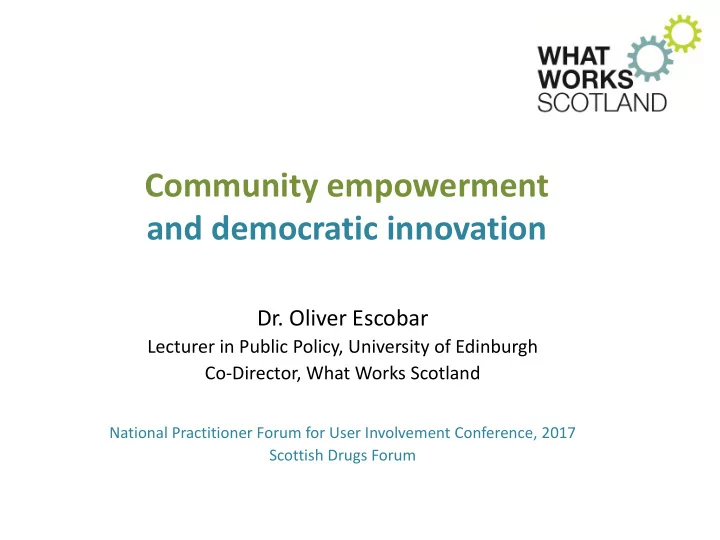

Community empowerment and democratic innovation Dr. Oliver Escobar Lecturer in Public Policy, University of Edinburgh Co-Director, What Works Scotland National Practitioner Forum for User Involvement Conference, 2017 Scottish Drugs Forum
Why public participation ? (Involve 2005) • Addressing complex problems drawing on untapped knowledge, experience and perspectives • Making better policies and ensuring effective implementation • Improving public service design and delivery • Building legitimacy and trust in public institutions • Developing citizens’ skills, confidence and ambition • Enabling active citizens and communities
Participation in local decision-making in Scotland • 96% of the Scottish population said that people should be involved in making decisions about how services are planned and run • 80% said that people should be involved in deciding how money is spent on services • 86% said that people should be able to volunteer alongside paid staff to provide public services Source: Scottish Social Attitudes Survey 2015
Policy context for community empowerment and democratic innovation • Open Government Partnership • Relaunch of the National Standards for Community Engagement (2016) • Community Empowerment (Scotland) Act 2015 • Participatory Budgeting national programme (2014-2017) • COSLA Commission on Strengthening Local Democracy (2014) • Parliamentary Local Government Committee (2013, 2014) • National Planning Framework 3 • Christie Commission on Future Delivery of Public Services 2011 • Audits of Community Planning Partnerships (2011, 2013), Review of Community Planning (2012, 2016)
Community Empowerment (Scotland) Act 2015 [CEA]
Key developments in CEA (regarding community planning and engagement) • Formalises CPPs and places new duties on a range of partners • Strong focus on ‘improving outcomes’, tackling inequalities, and involving ‘community bodies’ • SOA > Local Outcomes Improvement Plan (LOIP) + Locality Plans • Participation Requests • Participation in Public Decision-Making
International trends in participation
Evolving role of citizens: 2 stories can be told Story of decline Story of progress • Declining… • What’s happening is that citizens are becoming: – Voter turnout in elections – better educated, more – Trust in & legitimacy of knowledgeable and critical; traditional institutions of – less deferential to traditional public life (e.g. authority and elite-driven / government, media, hierarchical forms of governance; parties, unions, community associations, – dismissive of conventional channels and engaged in etc) alternative mechanisms of – Social capital : community political expression; ‘ethos’ & networks • The myth of public apathy (Dalton 2005; Putnam 2001) (Norris 2002;Castells 2012;Eliasoph1998)
Debunking the myth of apathy: Civic participation in Scotland • Record-breaking participation in the independence referendum • A growing, vibrant civil society / third sector: social enterprises, development trusts, housing associations, transition towns, etc • Civic participation on the rise: – 55% in 2009 – 61% in 2013 – 69% in 2015 (Scottish Social Attitudes Survey 2013 and 2015)
But is all participation good? • Paradox of growing participation and growing inequalities (Walker, McQuarrie & Lee 2015) – proliferation of traditional consultation and de-politicised forms of participation • Inequalities in health, income, wealth, education… stemming from inequalities of power and influence? unless corrective measures are taken “participation of all varieties will be skewed in favour of those with higher socioeconomic status and formal education” (Ryfe & Stalsburg 2012)
In the last 12 months, have you participated in a forum to discuss policy or community issues?
Stay standing if at that forum there was a reasonable … • … gender balance • … mix of personal and professional backgrounds • … range of perspectives and opinions • … age range (i.e. 3 generations) • … income range • …sense that most participants felt included and influential • …sense that most participants enjoyed it • … sense that their participation would have a clear impact
Key challenges in organising public participation processes Inclusion Impact : and clear link to decision diversity making Quality of dialogue and deliberation
What Works in public participation? Democratic innovations around the world
3 components of ‘what works’ in public participation Multi- Inclusive & Empowered & channel deliberative consequential
Multi-channel • Accommodating a variety of forms of participation: – online, face to face, combined – light-touch vs. intensive – The power of ‘ crowdsourcing ’: tapping into ‘the wisdom of the crowds’ ( Surowiecki 2005)
Inclusive AND deliberative • Inclusion and diversity are crucial for meaningful, legitimate and effective participation – demographics AND perspectives – lowering barriers to participation • Public deliberation is about: – learning about the issues – hearing & discussing different views – then, making informed decisions • Examples –’mini - publics’: – Citizens’ Juries on health inequalities and policy (UK) – Citizens’ Dialogue on Public Health Goals (Canada) – National Public Policy Conferences (Brazil) – Melbourne Citizens’ Panel on Finance (Australia)
Empowered and consequential • Participation thrives when important issues and resources are at a stake, and citizens feel their contribution can actually make a difference • Example: – Participatory Budgeting, from Porto Alegre (Brazil) to 2,700 localities around the world
http://participedia.net
Civic organisations must ask: • Are we harnessing the power of combining online and face-to-face platforms for public participation and action? • Are we creating opportunities that accommodate the variety of ways in which people may want to participate? • Are we creating inclusive processes where everyone has an equal chance to participate and influence? • Are we creating deliberative spaces where participants can learn, hear different views, and engage in dialogue to offer informed opinions and considered judgements? • Are we fostering empowered processes, where people know that their participation can make a difference?
Thank you!
Recommend
More recommend